All photos courtesy of Alaina Leary
Happy Aggressively Affectionate Week, everyone! Did you do Valentine’s Day? Galentine’s Day? Gal Palentine’s Day? My girlfriend and I celebrated early with a fancy dinner on Sunday night followed by a few solid hours of video games. I’ll take Dragon Age over crowded restaurants every time. But I’m also a big ol’ squishy romantic at heart — and so I’m excited to introduce this week’s Queer Crip Love Fest guest.
Alaina is a 24-year-old grad student living in Boston and working in book publishing for kids and young adults. She’s not a fan of Donald Trump, Bury Your Gays, Autism Speaks, or the lack of diverse representation in books. But she loves her girlfriend Macey, whom she described like so:
“I love that she’s selfless and the way she cares about people. I can see it in her eyes when she’s thinking up a great present for someone, I can hear it in her voice when she calls someone to make them feel better. We can be stuck together in the most awful situation, like we’ll be in an airport waiting hours for a delayed flight, but it doesn’t matter because we’re together, we make it fun. She’s the kind of person you want to be stuck in an airport with. She’s the kind of person who, when she comes into the room, it’s a better room than it was before.”
They’re high school sweethearts. They met in Agricultural Mechanics class. On the first day. Keep reading, y’all — this one is a goodie.
Okay, first I want to talk a little about you because I’ve admired your work for so long. Can you tell me about your grad program?
I’m studying for my Master of Arts in Publishing and Writing. I started in September 2015, right after undergrad, and I will graduate in May of this year. Most of my focus has been in online and book publishing. I’ve taken a lot of classes in electronic publishing, editing and writing, business and innovation, book publicity, stuff like that. Right now I’m in a class where we’re writing stories for the Boston Globe Magazine. We’re going to pitch those stories to them and be accepting assignments from them on the local community — so I’m hoping to sneak some marginalized stories in there if I can.
Yes, that’s great! You’ve also worked with Disability in Kidlit in the past, right? I know they’re going on a break, but they’re such an awesome resource that I’d love to hear more about that.
Yes! I have written for them before. I’m not one of the founders — though I wish I were, because what a great idea — but I’ve written some reviews for them and am friends with the people who started it. Disability in Kidlit is an important site because it, to my knowledge, is the only one that focuses on disability representation in children’s, middle grade, and young adult lit. Possibly even in any lit!
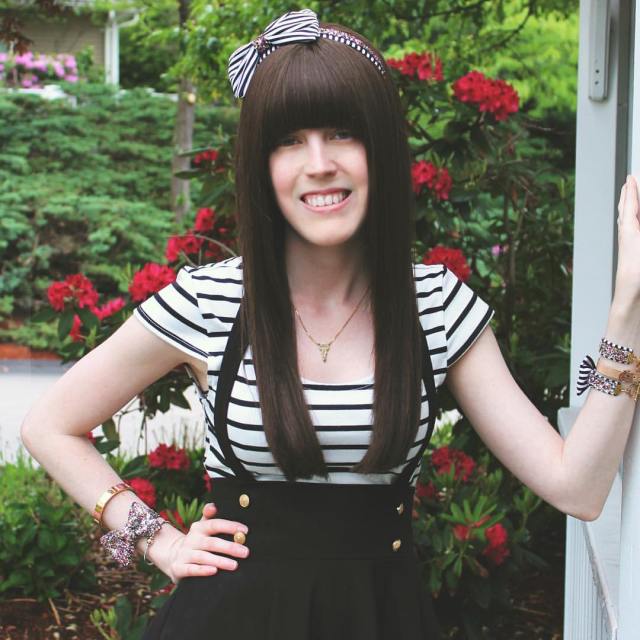
I’ve been working with the nonprofit We Need Diverse Books for a while now, and a lot of what I’ve done with them is dependent on Disability in Kidlit, Latinxs in Kidlit, and Gay YA. All these sites are feeding into these groups of marginalized people whose stories aren’t being represented. Book reviewers aren’t necessarily vetting these books for whether or not they’re good representation, and that’s what sites like Disability in Kidlit do.
What have you been doing for We Need Diverse Books?
I’ve mostly done social media for them since last year. I went to BookCon back in June 2016 and livetweeted their young adult panel, which had some great authors like Leigh Bardugo, Gene Luen Yang, Sherman Alexie, Anna-Marie McLemore. It was focused on loss and grief — it wasn’t actually focused on diversity — but they were very careful in vetting diverse authors of diverse books. It had a really good spin on that whole topic.
I’ve also hosted and moderated a lot of We Need Diverse Books’ Twitter chats — picking people and themes for those, asking questions, getting the audience involved. Every once and a while there will be a really disability- or queer-specific question, and they’re like “We have someone who can answer that!”
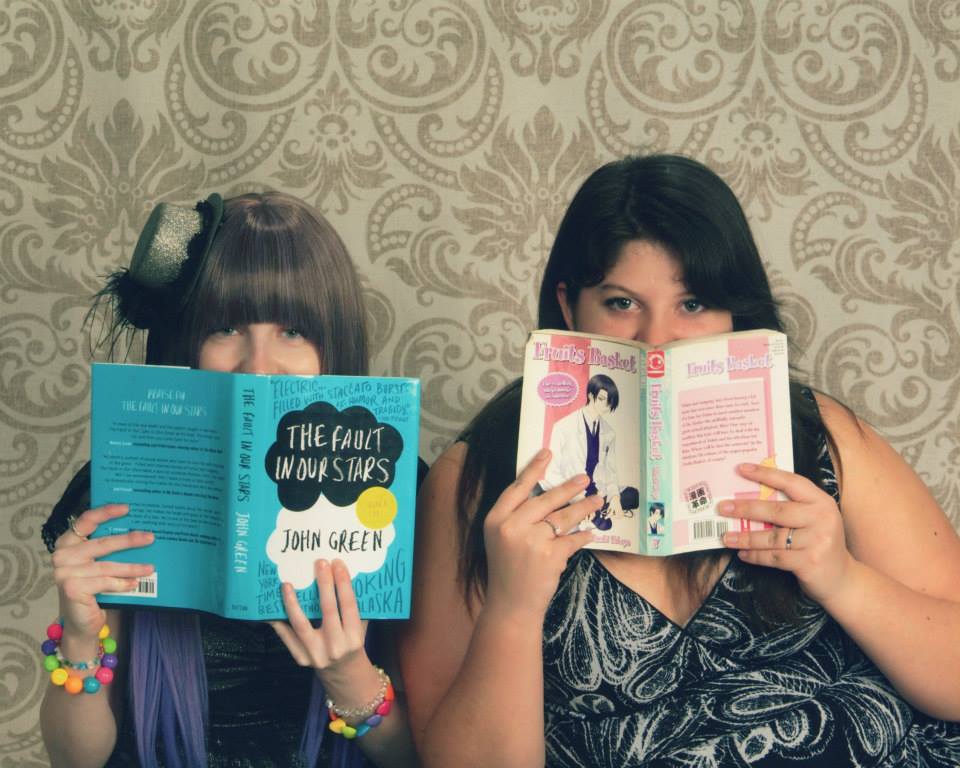
That’s as good a segue as any to talk about your girlfriend, Macey. You’ve been together for a long time!
Yeah! We just made it to eight years.
That’s fantastic, congratulations. You met in high school?
Yeah, first day.
Oh my god. Okay, can you tell me your origin story?
So our story actually starts with the first class we were in. We went to a vocational high school where, instead of being a technical school where you’d learn hairdressing or graphic design or something, you learn about animal science. So we actually met in an Agricultural Mechanics class — which, like, I still don’t know how to do anything besides turn my car on. But we met on the first day of school, and she asked to eat lunch with me and some girls, and I just kind of liked her immediately, if you can believe that.
“ I was not completely out as being queer — I was semi, half-in-half-out — and she wasn’t out at all. So we started out as friends… I said ‘Why don’t we give it a go?’ And she said ‘I’d love to.’”
I was drawn to her for some reason. She was reading; that might have been it. She had glasses; that could have been it, too.
Speaking from experience, both of those things help!
Right. At the time, I was not completely out as being queer — I was semi, half-in-half-out — and she wasn’t out at all. So we started out as friends, and we were friends for about a year when I realized that our friendship was developing into a pretty serious crush. And then I was like “Oh no, straight girl, friend, me — a typical scenario.”
Eventually, it just kind of came out among our friend group that I liked her, and she said “Y’know what, I’ve been feeling the same kind of thing.” And I said “Why don’t we give it a go?” And she said “I’d love to.”
That’s so nice!
We were kind of shy and nerdy in high school, so I think I asked her out over AIM.
Classic.
Yup! And her response was via handwritten note, so I still have that.
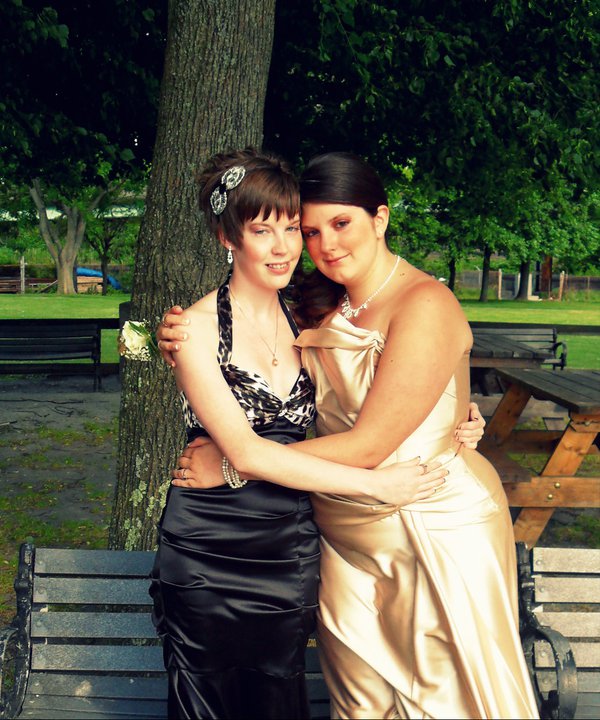
Aw, that’s so sweet! What a nice memento.
That’s pretty much our story — and right after we started dating, it then became “How do you date your best friend? What do we do if we break up? Is she bi? Is she gay? Is she just gay for me?” So many questions for both of us. And the whole coming out process to all our friends and to her family and most of mine, we navigated together. Which is just wild to me, looking back on it.
How has that been? Have you generally had good experiences through all that?
Yeah! I mean, there’ve been some rough patches, like every coming out situation. We have had a lot of really good experiences, though. Our friend group in high school was very accepting. And my family was very accepting. We’ve hit a couple of rough patches with people not believing in bisexuality, because a lot of people are like “Oh, you can be gay or you can be straight, but you can’t be bisexual,” which is what we both actually are. But we’ve chosen to not really push that issue with most people, because we’re dating each other — so I guess if they don’t believe us, that’s fine. It doesn’t really affect our situation.
“Right after we started dating, it then became ‘How do you date your best friend? What do we do if we break up? Is she bi? Is she gay? Is she just gay for me?’ So many questions for both of us.”
We pretty much went through the whole experience together. I knew I was queer a lot earlier than she did, so I came out a lot more easily and a lot younger to my family. So I was being a support system for her, which was new to me: learning how to be patient with someone as they identify with themselves and as they chose to tell people, and dealing with the fallout of what it’s like to tell someone. Even someone who ends up being accepting, it can be a shock.
Absolutely. I came out really young also, so I’ve had what I would imagine is a similar experience. Being out in high school is a very specific type of being gay or queer. And even if you ultimately don’t lose any friends or whatever, it can still be kind of a rocky road. It’s nice that you had someone there to go through it with you, but I can see how it’d be kind of strange to experience both sides of that negotiation at the same time.
It was. And I think, for me, what was so weird about it was that I had always been culturally taught that you just know you’re gay the minute you come out of the womb, basically. And I did! I don’t remember not being gay. But my girlfriend had a different experience — she really just didn’t identify as gay or straight, and all of a sudden she was like, “Yeah, I guess I like everyone.” For me that was weird at first, because I had never experienced that before. And I was like “If you don’t know, are you really even gay?” Because I had always heard that you were born that way and you just know that you are.
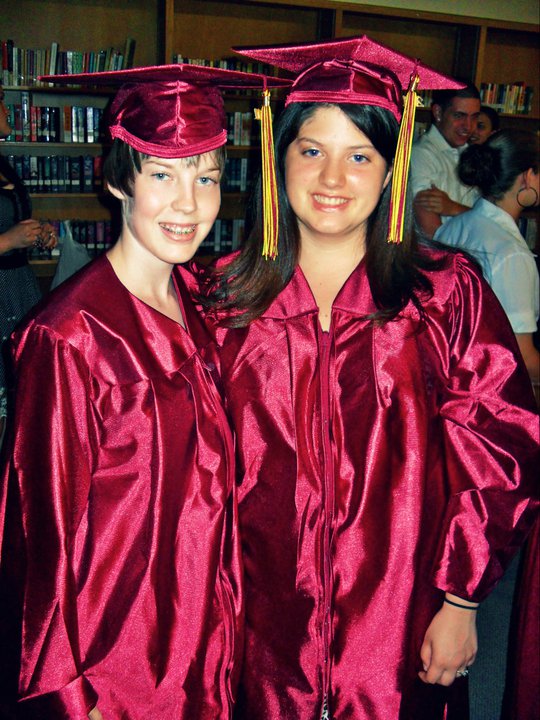
Have you since shifted your views on that, as a result of being together?
I’ve definitely shifted my views. And I had an aunt come out as trans and transition in the last couple of years — so I’ve kind of learned that either people don’t know everything, or they don’t want to deal with it, or they sort of know somewhere inside but they’re not ready to accept it yet. And I think, no matter what part of the LGBTQ spectrum — or even disability, y’know — you’re on, that’s completely valid. I got older and realized that there were parts of myself I hadn’t been honest about. I started to realize more why that was so common for people in the LGBTQ community.
“I just had this feeling inside me that disability wasn’t an identity or something to be proud of or tell people about. It was hush-hush: you don’t want your employers to find out, you don’t want your friends to find out.”
Was disability one of those things you weren’t being a hundred percent honest with yourself about?
Absolutely, yeah. The way I would put it is that my internalized ableism ran deeper than my internalized queerphobia. And I’m not sure why that is, to be honest, because I was actually raised by two disabled parents. But I just had this feeling inside me that disability wasn’t an identity or something to be proud of or tell people about. It was hush-hush: you don’t want your employers to find out, you don’t want your friends to find out. You try to be as well as you can, suck it up as much as you can, and not ask for accommodations until the last possible minute. It took a lot of unlearning and a lot of social justice for me to get to a point where I’m like “Y’know what, no. I’m just gonna say it.”
I think that’s true for a lot of people in our age bracket who’ve come to disability activism as young adults. It’s in spite of ourselves, regardless of how progressive our families were. I was born two years before the ADA passed, so I wasn’t aware of it, because I was two — but you can bet my parents were. They had done their homework. But they didn’t know how to keep internalized ableism from becoming a thing in my life. They were nothing but supportive of me, but it still gets in there. How has unlearning that habit played itself out in your relationship?
I want to back up and bring my good friend Katie into this, actually, because she deserves some credit. Not to always blame your moment of truth on some disabled person — because that’s such a typical story — but it wasn’t really until I was in college and met Katie, who uses a wheelchair, that the process started. I didn’t even know what ableism was, if you can believe it. I kind of came to that unlearning as if I were an ally — which I think is very common for people in the queer community too. At first you’re like “I just really like gay people! I really support them!” And then all of a sudden you’re making out with them. That’s kind of how I came to disability too. I was like “Oh, I’m really just here to support,” and then I’d find myself getting fired up about these topics, and them feeling very personal. Katie would say something about accessibility or the questions people asked her, and I’d be like “Yeah! That does suck! … Why does that feel like it’s happened to me before?”
“I kind of came to that unlearning as if I were an ally — which I think is very common for people in the queer community too. At first you’re like ‘I just really like gay people! I really support them!’ And then all of a sudden you’re making out with them. That’s kind of how I came to disability too.”
Right! So were you not identifying as disabled at that age?
I wasn’t, no! I didn’t really start until undergrad, honestly.
So you met Katie and saw some similarities in your experiences, and then that was it? Or was it sort of on its way to happening anyway?
I would say college and the internet in tandem opened me up to the wider disability community. My parents, like I sad, were/are disabled, but other than that I really didn’t know anyone else. In college I sort of just fell into this really disabled friend group, which was awesome. We had more disabled people in our group than abled people. We just kind of flocked together. In tandem with my social justice activism and learning on the internet, I was meeting all these people in real life who were like “Y’know, I have autism,” or “I have cerebral palsy,” or “I have dyslexia,” and these were things they were cool with talking about. They were fine with asking for accommodations. And I think it just opened my eyes to the fact that it didn’t have to be this hidden part of me — this very special ed, going to the doctor’s office kind of thing.
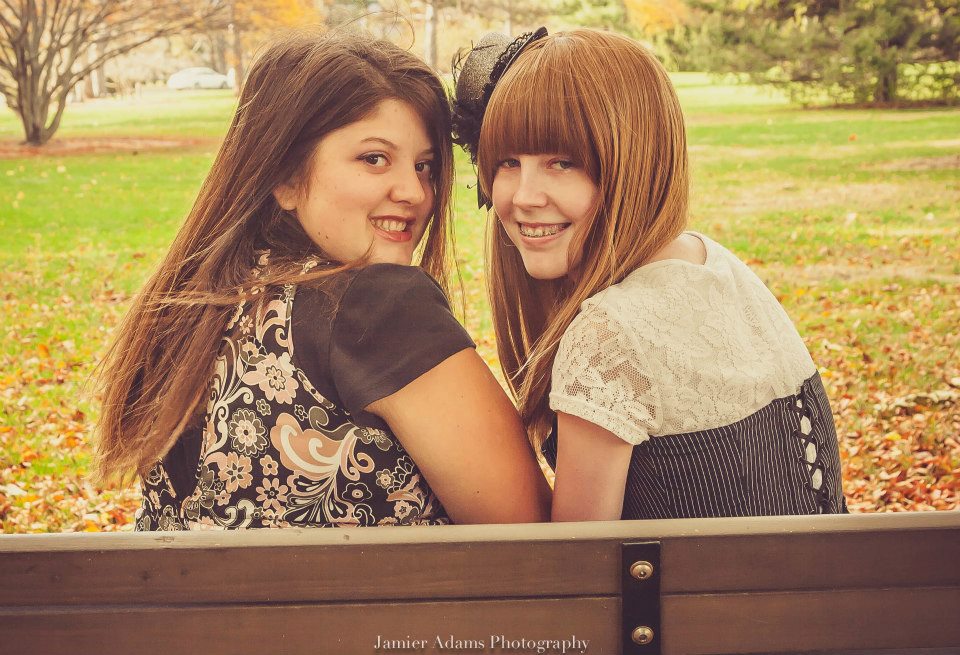
So you and Macey were already together when you started to discover disability politics?
Yes.
And is she disabled also?
No.
So were you her first exposure to those sorts of ideas? When you started to get on board, so did she? Or did she already have experience with it in the past?
She definitely did not have experience. I would say she learned about it at the same time that I did, through Katie as well. And then she started to see me opening up to it, and as our friend group grew and became more vocal about their own disability experiences, so did I, and that was a big moment of change for both of us.
“I think it just opened my eyes to the fact that it didn’t have to be this hidden part of me — this very special ed, going to the doctor’s office kind of thing.”
One of the biggest things we’ve had to talk about as I’ve gotten more into disability politics is, I’ll be honest: like everyone else, disabled or not, I’m lazy sometimes. What we needed to establish in order for that to work was “Do you actually need an accommodation or assistance right now, or are you just being lazy?” Because you never want your partner to be the person who does everything for you or feels burdened by you, or feels like they have to help you with all these things you can’t help with around the house. And she’s just been really respectful in terms of when I can’t do things, and being accommodating.
I have intersecting disabilities, so in addition to physical difficulties I also have attention deficit difficulties. So sometimes it’s just a matter of me explaining “I put the laundry in, but I forgot to put it in the dryer!” “I made a ham sandwich and forgot about it!”
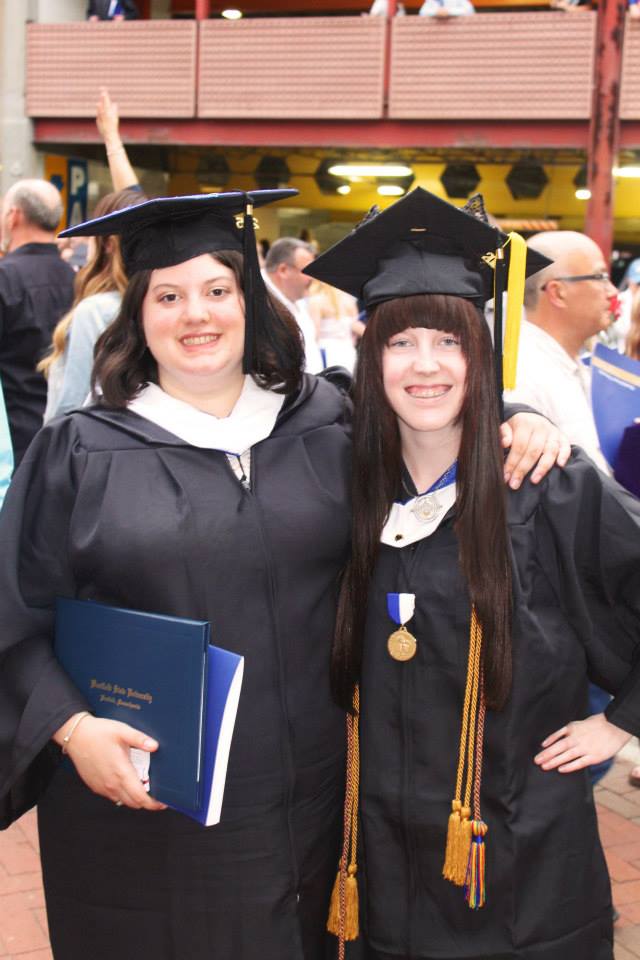
It’s really important that you bring up the word “respect,” because I think that’s the thing a lot of disabled people want in our lives in general — but especially from our intimate relationships. Can you think of a particular time that really showed she understood your access needs?
I feel like it happens on such a daily basis. We’ll be going to the grocery store, and she’ll ask me if I need my cane or not because it’s already in the passenger seat with her. We live in an apartment and we have dumpsters where we throw our trash out, so if I can’t lift it and throw it in, she’ll lift it and throw it in for me. She’s really good about all the sensory issues that I have — so sometimes I’ll need captions, or I’ll need something repeated, or I will completely forget what someone looks like, or be somewhere that’s just sensory crazy and need to get out. She’s awesome about that stuff. She’ll be like “We’ll get you out of there, we’ll get you somewhere chill, I’ll rub your back.”
Sometimes that’s all you need: just someone to be cool with accommodating whatever’s going on. And I think one of the reasons she’s so good about that is because she knows what it’s like to deal with her own struggles, because she is also a marginalized person. She’s queer, obviously, but she’s also Latinx and she’s plus size.
We talk a lot about our intersecting marginalizations and how our experiences are similar and different. Because we have those purposeful, feminist discussions with each other, we both really get that sometimes we just need different things, and one person just needs to be able to say “No, right now, I need this.”
“You never want your partner to be the person who does everything for you or feels burdened by you, or feels like they have to help you with all these things you can’t help with around the house. And she’s just been really respectful in terms of when I can’t do things, and being accommodating.”
So what does love mean to you?
I think about this question a lot, because I have been in a relationship for so long, and so many of my friends and family members have noticed that it’s noteworthy that I’m still dating my high school sweetheart. Love, to me, really means unconditional love. I think love starts from a place of excitement and passion, and mutual interest in each other that you really get excited about together. And then it grows into something so unconditional. Anyone who’s been in a long relationship can tell you that there are very difficult times and very stressful times, and there are times that you’ll be tired and they’ll be cranky, or you’re both tired and cranky — and it’s the unconditional love and respect for the person, and remembering to always be better, that gets you through those times.
“Sometimes that’s all you need: just someone to be cool with accommodating whatever’s going on. And I think one of the reasons she’s so good about that is because she knows what it’s like to deal with her own struggles, because she is also a marginalized person.”
I think someone that you really love makes you want to be better, but you also want to be better for them. It’s so easy to fall into the old traps of like, whining and complaining, or nagging, or snapping at someone when you’ve had a bad day. And I think if you really, unconditionally love someone, you take a minute and you step back and say “Stop it, self. You’re just being an asshole. This person’s done nothing but love you, and you should treat them with respect.”
Apologies go a long way, and I’ve always been taught to own up to what you do, apologize, and have that discussion — and then actually take some action and be better. A lot of what love means to me is that commitment to grow, and recognizing that someone will change. Because if you meet someone at 15 and you start dating and now you’re 24, that’s a lot of years and a lot of change. You’re changing as a person as you grow older. And I think what sustains love is you recognize the person is going to change, and that you’re going to change, and that you’re committed to making that work.
Seems to have worked, apparently!
I’ve just kind of rolled with it. Macey and I have changed so much. And like you said, I got into disability politics while we were together. I came out to the world as disabled, I started walking with a cane, I started writing public articles about disability and autism and all of these things, and being so public about that. That’s definitely a huge shift of identity for both of us, because she’s a part of my life in this relationship. Those kinds of changes are things people go through together and you just have to be ready to roll with it.
“We talk a lot about our intersecting marginalizations and how our experiences are similar and different. Because we have those purposeful, feminist discussions with each other, we both really get that sometimes we just need different things.”
You also identify as nonbinary, right?
Yes.
Did you come out as nonbinary while in your current relationship?
I did. It’s funny that you ask that, because I have a very long and bizarre relationship with gender identity that’s still in the works. I originally came out as trans to Macey while we were still in high school, and at the time, I wasn’t really sure what I wanted to do with that. Maybe socially transition and medically transition, maybe change my pronouns. I experimented with the pixie cut and kind of gender-neutral, masculine look. That was pretty early in our relationship, now that we’ve been together for eight years. Because we started dating when we were sophomores, and it was senior year that I told her I wasn’t sure how I was feeling about my gender identity.
I thought she wouldn’t want to be with me, even though she was bisexual. That should be a fail safe. But I still imagined that it would be too difficult. I guess that was one of the moments early in our relationship when I was like “She’s in this for the long haul, and she’s okay with change and the unknown.” That’s really the reassurance I think I needed to move forward with our relationship — and to feel completely, radically vulnerable with another person. Ever since then I’ve been able to be so much more honest with her, because that was when I told someone something I’d been thinking about since I was little but never shared with anyone.
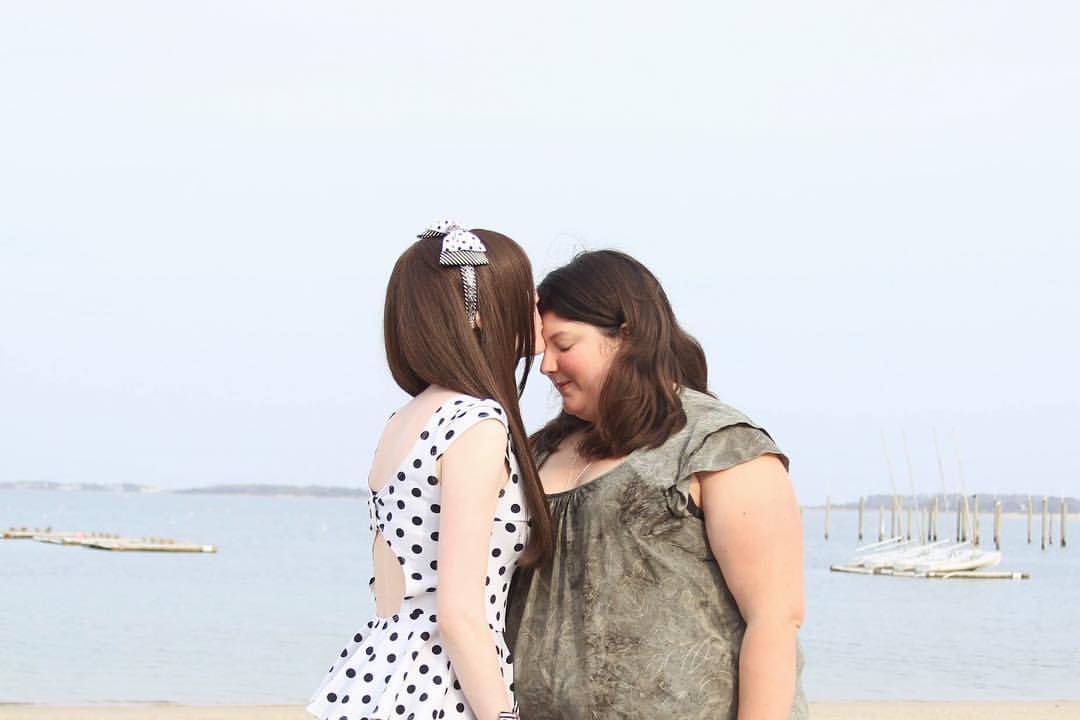
I love that, “radically vulnerable.” I think vulnerability is tough for disabled people, because you’re sort of assumed to be perpetually vulnerable but also constantly fighting against that. So it’s great that your relationship is a place you feel like you can go to let down the guard.
Right. It’s one of those things that I’m going to be constantly working on, because I think we all are born radically vulnerable as kids, and we’re all so very open to the idea of just being whoever we are when we’re young. And for many of us, our first experiences with doing that are being shut down — whether it’s by our parents or educators, classmates, other family members. Being shut down for being who you are and living your life.
In my case, I was disabled as a child as well, so living your life in a disabled way, being shut down and being told that the way that you speak or walk is not correct and not good. I think that it turns people away from radical vulnerability, and we have to kind of relearn how to do that when we’re in these relationships. Because it really is the only way to get to know someone and feel safe with them: to know that they know you at your core, and that at your most vulnerable, they’ll still be there. I think if you haven’t reached that point yet, there’s still that part of you that says “Well, when they see this, they won’t wanna.”
“I think what sustains love is you recognize the person is going to change, and that you’re going to change, and that you’re committed to making that work.”
I think that’s a really common fear, but for disabled folks it’s especially acute. Because there’s this narrative that you’ll always be too much, or that there’s gonna come this breaking point just by nature of who you are. Especially if your partner’s not also disabled. But if they are also disabled, everyone simultaneously assumes that’s who you should be with, and also doesn’t understand how you could be in that relationship at all! So it’s sort of a lose-lose.
I also have an able-bodied girlfriend, and it’s interesting the expectations that people have for a mixed-ability relationship. That person being not just your de facto caregiver, but ultimately your savior. And your job is to make them a better person. What would you say to somebody who was implying your relationship should be like that?
This definitely has happened before. People see Macey holding doors open for me while I’m walking with a cane, or holding my coffee for me, or throwing the trash out, and they make these assumptions. What I would say is that I don’t think disability is the only thing in life that makes our experiences different — and no matter whether you’re a mixed-ability couple or you have disabled partners or able partners, there are different things all parties bring to the table. Even in a couple where both people are abled, there are going to be situations where either person acts as more of a caregiver or nurturer. It’s just natural to being human.
Being disabled doesn’t make me the person who needs to be taken care of all the time. In fact, there are plenty of times when my girlfriend really needs a pick-me-up — and I’m the one who snaps her out of it with a good ol’ feminist pep talk. Everybody needs that sometimes.
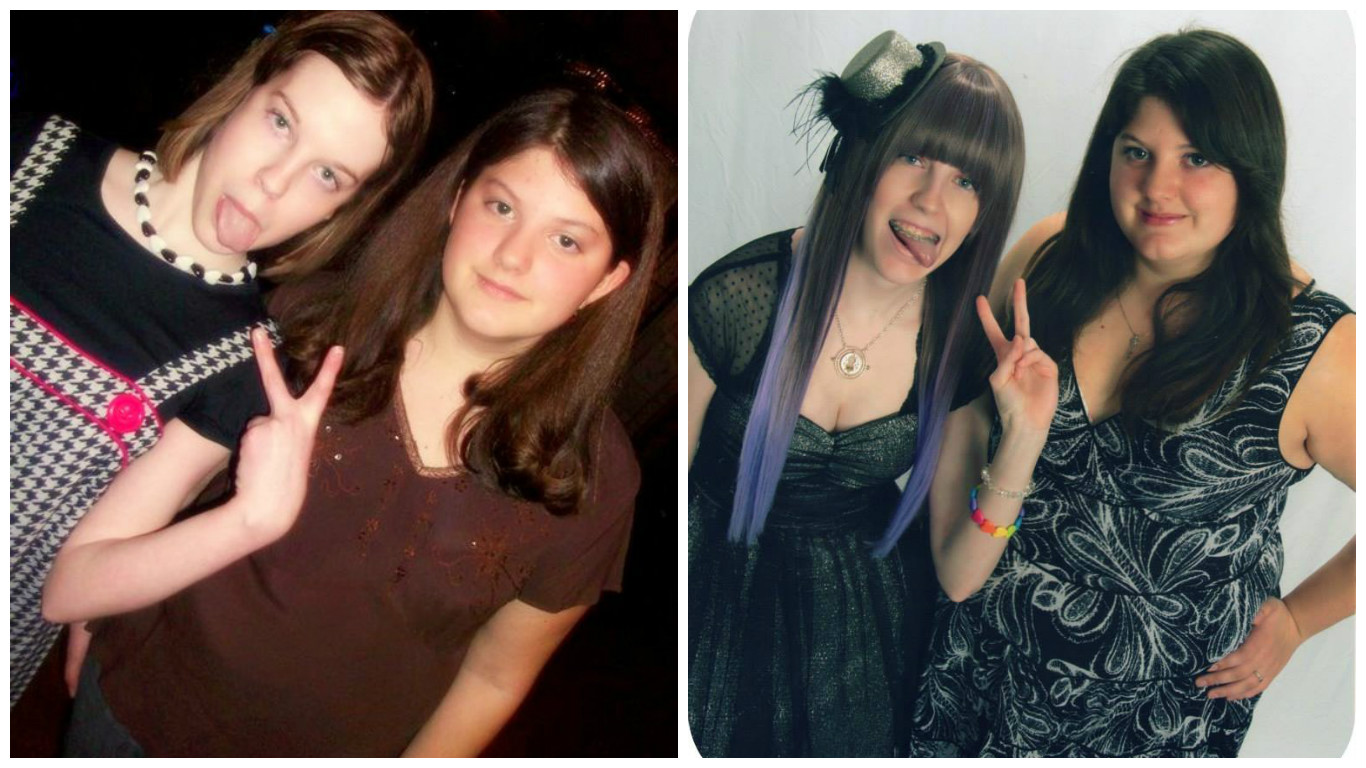








Comments
adorable and lovely in all ways.
Thank you for hating Autism Speaks and for writing about the intersectionality of being queer and disabled in a school environment.
This was a great/interesting read. And romantic for this week too.
Thank you. :)
I enjoyed reading this. The pictures are so sweet too.
This was so adorable! And I felt very inspired by Alaina’s work in publishing and “We Need Diverse Books” as I’d like to do something similar in the future.
That was beautiful and life-affirming. I think this is the first time I have heard “high-school sweetheart” used in a Queer space. The heteronormative associations with that phrase kept me dating boys and in the closet in high school because I was taught it was great to marry your high-school sweetheart and gay marriage wasn’t legal in my state…even though the girl I loved without understanding it and I talked about moving to California to get married. I love what she said about being a “straight” ally because you really like Queer people. That was totally my experience! :) I love that they are both bisexual. I love what she said about having attention deficits and other disabilities but not wanting to be lazy and knowing when to ask for help. Their relationship sounds very strong. I’m inspired by the way they communicate about the things that make them unique. My main thoughts while reading this were – these girls and this relationship is so unique and so normal. Everyone and every relationship is unique and that is normal. They seem really happy and that makes me really happy and full of bi pride and neuro-atypical/neurodiversity pride. These disability articles really make me aware of how much ableism I was taught (e.g. hearing at a young age about how bad the ADA act was for businesses). Please keep chipping away at our cultural ableism and biphobia with more articles like this.
Really loved this article!